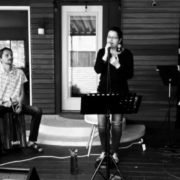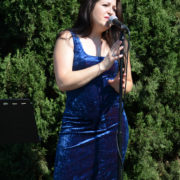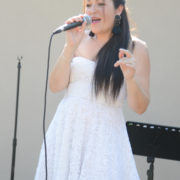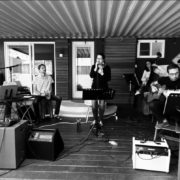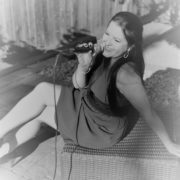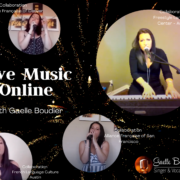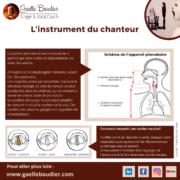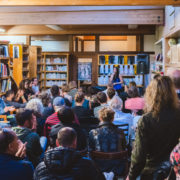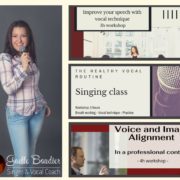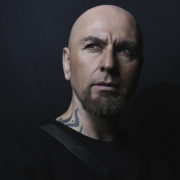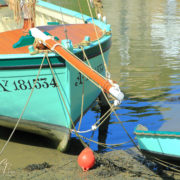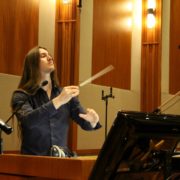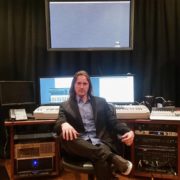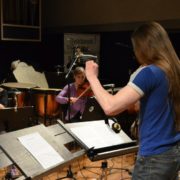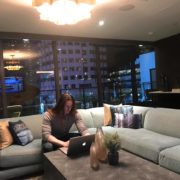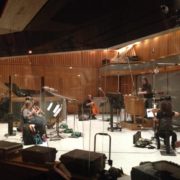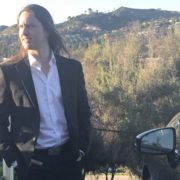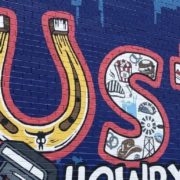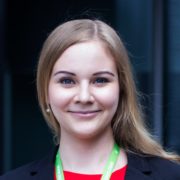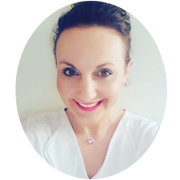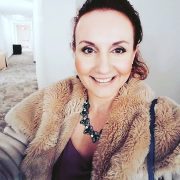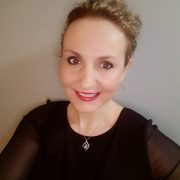The musical rebirth of Gaelle Boudier – Singer and vocal coach in Austin, Texas.
/in Austin, Interview, Member/by Kaisa KokkonenMEET AUSTIN-BASED GAELLE FROM FRANCE!
We had the pleasure of interviewing Gaelle Boudier, an Austin, TX based singer and vocal coach. Singing, Coaching, and Teaching, are three words which accurately reflect her world.
Her strong connection with music led her to study several instruments and graduate from the French Conservatory of Music.
Gaelle became a skilled vocal and musical coach, as well as a professional singer starting in the south of the France, to San Francisco Bay Area, and now in Austin.
Gaelle, how did you become a vocal coach and singer?
My story? At first, it’s no different from anyone who is dreaming about music. A song, an instrument, a chord, a moment of life…. everything is linked.
As far as I can remember, I was always attracted to music and dance. During my childhood, my parents and grandparents loved to listen to music. I started singing along all the hits I found in their music collections. I was fascinated when my grandfather played the harmonica. Even though he had experienced a major stroke, he still managed to find the strength to play. Music was such an important part of his life.
My parents had a big house in the South of France with three floors, a grand staircase, and many little nooks. There were multiple areas with a big echo – like the stairs or in a little bathroom. That’s where I loved to sing and invent melodies and lyrics… I was dreaming of the day I would be in front of a mic singing for a crowd!
At the age of four, I was giving “my first singing classes” to my dolls and my family. Everybody in the house, even my parent’s friends had a private lesson, haha.
By chance, I found at the back of the house, an old and dusty Bontempi organ. It was my first musical instrument – I was trying to play and sing at the same time.
Later, I joined a school choir. It was a revelation! I took a test and was admitted to the Conservatory of Music. I started studying music in college alongside my music school classes. After high school, I was supposed to enter nursing school. However, the day I returned my registration form, I changed my mind. I knew all I wanted was to dedicate my life to making music.
Instead of nursing school, I was happy doing what I loved: singing, playing, studying ten to twelve hours of music a day. I shared my time between philharmonic and harmonic orchestra, choir, classes, internships and shows.
My career was on track…
Do you feel you are more a singer or a vocal coach?
I couldn’t choose between my public and my students. I’m doing both by choice. I love to share, whether on stage or in a classroom.
When you sing or play in front of an audience, feeling this energy is totally amazing. All my senses are awake, all my emotions are multiplied. I like to perform and see my public on this musical journey with me, giving joy by offering them a moment of escape, a musical break. It’s fascinating!
I feel complete when I’m passing on my knowledge, it is a true vocation. Teaching people to improve their voice by not only doing some vocal technique but also a real exchange. Taking into consideration the student’s unique voice and according to their individual needs, instructing confidence by overcoming shyness and receiving in return is an every day gift. I like to think that I can give this breath of freedom to my students.
Where do you draw inspiration from?
After studying classical music for several years in middle school and high school, one of my teachers opened me up to other musical tastes. I experimented with different music styles such as baroque, modern, rock and jazz. I even took part in a gospel choir at some point.
Today, my choices and main inspirations come from singers such as Eva Cassidy, Dany Brillant, Diana Krall, Nougaro or from bands like Muse or Queen… I discovered that I love playing with vocal colors and singing jazzy lounge, bossa, rock songs and the great classic French songs.
One of the greatest inspirations in my life is Serge Martial, the singer of Route 66. I had the opportunity to meet and work with him in San Francisco. His philosophy in life was to Live, Laugh& Love… He enjoyed each moment in his life. I became a workaholic, because of the pressure I felt from the classical music world where all has to be perfect. He became a mentor to me, he gave me the confidence and lightness that allowed me to truly open myself again and become the person I was hiding for so long.
He took part in my musical rebirth.
My musical rebirth? Can you share a story that occurred to you in the course of your career?
My career has had two important and decisive turning points.
The first was during my university years, I had graduated with honors and was on a path to becoming a music teacher, a professional musician and singer. To become a certified music teacher in France, you have to pass a final entrance exam.
I worked very hard to prepare for this, refusing to go on vacation or to my friend’s parties I knew that despite all my skills or knowledge, my main weakness was self-confidence.
Against all odds, despite my hard work and my good grades in all my school curriculum, and because it’s a competition, I failed the oral test. Only 9% of the candidates were accepted. I was totally stressed out, crying a few minutes before entering my exam room. It felt like my entire life was going to be played out over these few hours.
I was too far out of my comfort zone. I was unable to be myself during this crucial oral exam. I put too much pressure on myself. This blunt judgment on my capacity to manage my stress, more than my singing and musical skills and my desire to share, spoiled the image I had of myself. It opened the door to fear the judgement of others.
The consequence of this failure lasted almost 15 years.
However, I couldn’t imagine life without music or songs. No exam was going to take that away from me. I was still singing and performing in bands, teaching private lessons, working as a substitute teacher in French national education, and as singing teacher in an association of Performing Arts.
My classes, students and shows were successful. But still, I had the feeling of being an ‘imposter’. The fear of feeling judged by others made me incredibly nervous…. It’s crazy how failing an exam can undermine your self-esteem!
So alongside my musical activities, I started working as a manager for a famous luxury brand in France until moving to California in 2013.
CALIFORNIA DREAMING…
The second turning point was my expatriation.
It was a life changing experience to live in a foreign country. I was out of my comfort zone all the time. I didn’t speak English at all. I was far from my family, my friends, my habits. So I had to trust my abilities to make it work for me, but also for my family who always supported me. I had no other choice but to reinvent myself. Singing played an essential role, taking back its rightful place in my new life, and it has been my buoy.
In the French community, several people asked me to start teaching them how to sing. It gave me such pleasure that I also started to give some classes, as a volunteer in a French Association. It was a breath of fresh air. I felt really happy to go back to my roots.
The desire of singing in front of an audience never left me.
You know, that unforgettable utopia feeling of performing in front of people? In 2018, when I heard about an event with live music and vendors, called The French Fair in the Bay of San Francisco ( around 5000 to 6000 people attend) I decided to apply. I presented my work to the manager who then hired me to perform there. The event was a success. When I left the stage, I had three proposals for other events, a wedding cocktail, a Christmas party of the Alliance Francaise of San Francisco and the next French Fair.
It’s not without any emotion that I can tell you today, that at that time, I felt very proud of what I had accomplished, full of energy, and finally at peace with myself.
How does this experience serve your professional life?
It gave me the conviction to include in my classes, beyond the vocal technique, an in-depth work on self-esteem.
Learning to let go of vocals, accepting mistakes, being prepared to fail are an essential lesson to learn for every musician. No one had ever explained this to me. Performance and success were the only crucial part of my training so I didn’t have the tools to accept a failure before.
Now I know I can bounce back from any failure, and it’s very important to communicate this to my students.
When I prepare myself to do a performance, I am aware that no audience belongs to me. I realize that only a real sincere investment will make the magic work for any audience.
After doing this hard work, knowing that music always healed my doubt, I wanted to go further. I was convinced that music is an incredible gift that can help to manage emotions and express feelings. I followed a Music Therapist training which extended and completed my musical expertise perfectly. I worked for almost two years in a private clinic where I started a music therapy program. Music improved the quality of life of my patients, as a tool to build positive energy. My goal was reached.
How have you used your success to bring goodness to the world?
Since I was a teen, I always gave some of my time as a volunteer in several non-profit organizations. Offering my services is my little contribution to help others.
This year, when the stay-at-home order started, I offered two free classes per week. The first for teen/adult access to music therapy by the voice. The second for kids, sharing a musical story time. I thought about doing this for 3 weeks during the lockdown, but I ended up doing it from March to July. My goal was to give back some fun and relaxing activities during this crazy crisis.
With the Covid-19 situation, I realized that families have been facing some difficulties, such as a decline in financial income. So I decided to share my knowledge for free.
I started creating several advice sheets each month, explaining some vocal technique points and proposing exercises for people who want to work on their voice to speak with more confidence or sing. It’s geared towards everybody, beginner to advanced, with or without musical instruments and/or musical skills. If someone has a question or wants to try a voice lesson, I offer a free 20 minutes lesson.
I am offering free webinars as well. On the next one, I will teach how people can fight vocal fatigue. Now that we spend most of our time using a computer, we often use our voice badly. Some of us raise the volume of their voice and we force it unnecessarily. The webinar aims to help people to avoid those problems.
What are some of the most interesting or exciting projects you are working on now?
I’m still working on new songs and I’m very keen to have the opportunity to perform in downtown Austin, the city of music! Of course, I have to wait for the end of the pandemic. In the meantime, I performed a few online concerts, it’s totally different but I really like the opportunity to stay close to my public.
I continue my vocal coaching classes, spoken voice and singing voice, with more and more students from California, Texas, France, New York, Connecticut…
I cooperate with schools to offer my class as well.
Today, with virtual classes, limits are only those you impose on yourself.
One important thing for me is to coach people. They can develop confidence in their vocal abilities. Having learned from my past, I created a full program, available since July, on the voice and image alignment.
Vocal work is not only for singers. Everybody can improve the quality of their voice. For example improving diction or reducing stress before a speech.
Unblocking the voice and gaining vocal presence to increase your self-esteem, working on the phrase to be more convincing, using your vocal color to share the right emotion, and understanding that when the voice is controlled, you will improve the quality of the message you can express.
What are your “5 things I wish someone told me when I first started” and why. Many of us wish we knew better when we were younger…
My first advice is, if you want to be a professional in your discipline, you must have self-confidence. Don’t be too harsh with yourself. We all make mistakes, so don’t stay stuck on your failures. Instead, remain focused on your capacity to bounce back.
My second advice is to dare to test new things, be ready to work hard.
Talent is not sufficient to succeed, there will be a lot of sacrifice. To become a professional musician is like becoming an athlete. You have to stay focused on your objective and regular work is an integral part of your progress. Don’t hesitate to share your doubts with your family, friends, and lessons with mentors that can help you see a different perspective.
My third is to start to take care of your voice, have plenty of sleep, good hydration, let your vocal cords rest if you feel you are tired and practice self-awareness of your body needs.
Next advice, if you want to make faster progress, record yourself. It can be hard at the beginning, but a recording allows you to isolate your weaknesses, and to work with precision. Take the habit to listen to yourself. Work regularly to strengthen your vocal cord, create vocals automatisms by controlling your vocal gesture.
And my last is to never forget who you are, listen to your heart, and remember your pleasure when you did it for the first time!
Where do you see yourself in five years in your life and career?
Surrounded by my family and musicians, working with composers and singing my own nsongs. But still providing vocal classes as well.
I’m a singer and a vocal coach, invested in her passion, and first of all, my place is in front of you, whether on stage or in the classroom, sharing my emotions and my musical universe.
What is the best way our readers can find and /or follow you?
Website : www.gaelleboudier.com
Linkedin : https://www.linkedin.com/in/gaelle-boudier-7ab20015a/
Facebook : https://www.facebook.com/gaelleboudiersinger/
Instagram : https://www.instagram.com/gaelleboudier.singer/
Gaelle, this was very inspiring.
Thank you so much for joining us!
Find here two YouTube link:
Demir Demirkan “Brings It On” with his music – Part 2
/in Austin, Member/by Kaisa KokkonenWe had the pleasure to chat with Demir Demirkan, a 25+ year veteran Turkish singer-songwriter/guitarist.
Beginning at age 19, Demir Demirkan has produced and released close to 50 solo and collaborative albums and singles ranging from blues, rock, metal to film and TV series soundtracks composed for symphony orchestras, choirs and Anatolian instruments.
His life and career has been a journey igniting from Turkey, through Europe and to Austin, Texas – USA where he now resides with his wife and son.
His latest works reveal that he is back into where his roots are, Metal.
While building his career from ground up in Istanbul, he recorded and performed with Turkish musicians and bands mainly as a member of the Turkish Heavy Metal band The Pentagram a.k.a. Mezarkabul. Internationally, he recorded and performed with world-renowned names like Mike Stern, Al Di Meola, Dave Weckl, Trilok Gurtu, Omar Hakim and Phil Galdston to name a few. However, you likely now him best for the only Turkish song that won Eurovision Song Contest, Demir composed that song for his girlfriend at the time, Sertab Erener. Sertab Erener is a pop singer whose first album sold over 1 Million copies.
This interview is PART II. Part I was published a few weeks ago. Read more
Demir, can you tell us what brought you to professional musician/composer/producer career path?
I started playing at 12 and my first band was in high school when I was about 17 years old.
I was learning how to write songs and arrange them to the band and write lyrics and play guitar because I started with the acoustic guitar, and then I switched to the electric guitar.
I was going to come to the United States and study business. That didn’t happen because when I applied for that visa, I was denied.
I had to stay in Turkey and study something else. I could speak English. I was really good at writing stuff like songs and stuff like that – the literature. I had a chance to attend a college in Ankara to study English literature and humanities, so that’s what I did.
I met a lot of other musicians there and there was a conservatory. I made friends, formed different bands. I met my bass player friend from the band Pentagram, the first professional metal band ever recorded in Turkey. We still go on by the way.
In an odd way that visa setback turned me on to making professional music. I realized it is s possible to make a living in music IF you’re good. I wanted to be better – non-stop. I would practice eight or nine hours every day. Every day. I got better and better. Finally, I told my father that, “Okay, I’m going to be a professional musician.” The problem was that my older brother said the same before me.
Oh no, how did that go…what happened to your brother.
He came to the United States to study in conservatory. He dropped out after two years. He kind of got lost. He has perfect pitch. My father thought if your brother wasn’t able to do this, you’re never going to make it because you don’t have his talent, right?
I’m like, “Well, this is what’s going to happen.” They supported me as they sensed that whatever they say I’m just going to take my way. That’s how I came to Los Angeles.
I attended a school called Musicians Institute in Hollywood Guitar Institute of Technology, GIT was the department. A pretty good education. I stayed in Los Angeles for four years and that’s how my whole professional story began.
Right before I came to Los Angeles, we recorded an album with that heavy metal band that I was talking to you about – the Turkish metal band, PENTAGRAM . We never thought it was going to be released. I landed in LA and after a month or so, I heard the news that somebody is releasing that album in Turkey. That’s a first. It was year 1992 and the band got to be a huge hit, obviously, in the metal circles.
After four years in LA I went back to Turkey in 1996. I went into production because I learned so much in LA as a musician.
I learned how to become a producer, a songwriter, a shredder guitar player, like really fast and flashy and I learned a bunch of other music. I played with African bands in LA, I’ve played with jazz musicians, I’ve played with metal musicians, I’ve played with rock musicians, whatever. I produced different singer-songwriter material.
With all that knowledge and know-how I came to Turkey. It took me a few months to rise up to the top and become a hit. A hit producer, a hit guitar player, a hit songwriter, and then things started picking up so fast.
I had never seen that much money in my life first of all. It was crazy. I always thought that the more attention I got, the more responsibility it laid on me. I had to be better and better. I wasn’t sleeping for three days for production. I would get sick at the end of it, but it all paid off in the end, right?
It was kind of like a race within myself. The more good work you put out there, the more you have to work to be better. If you produce a few hits, and write a few hit songs, and then write a few bad songs, you’ll be the flavor of the month and then disappear. If you want to be in that light all the time, you just have to do better and better and that takes its toll.
The hair was gone, long nights, endless days, a lot of partying, I have to include that. In the end, you build a foundation that cannot be shaken. You’re a part of the culture and you win Eurovision Song Contest. The only win (for Turkey), and you’re one of the most popular heavy metal bands, flashy guitar player. You have your hits that you sing. You have your film music. TV series music and all that so this whole chunk of work actually is embedded in the whole musical culture of Turkey, which is a good pay off for all that work that I’ve done, without all that sleep, you know.
So what drove you? Gary is as eclectic and as crazy as you are. He is always sort of “I don’t care. I’m just going to keep going until I make it happen.”
I never thought about that. Maybe it’s good that I never thought about it because if I had thought about it, I would just break the spell.
I think it was a very magical run. If I see magic somewhere, I don’t really ask questions about it because if you do the science of how that magic happens, I think it will ruin it. I didn’t really poke into some of the things that I thought were magical. Love being one of them. I learned this in my whole meditation circles.
The drive. I don’t know, maybe it’s a character. I’m the fifth sibling of a huge family, maybe I just wanted to stand out. Maybe it was too much responsibility. Once you do a good thing, you have to be better. Maybe I like the attention or the money or it could be anything. I don’t really look into it. I just did it. I didn’t really think about it.
There were things that I thought about and analyzed, and they failed really badly. If I put thought into something then, like a purpose, a target, an intention, like a preconceived result, to start one thing, and put that preconceived target, or aim or result, as the fuel of the work, I always failed, I have to admit.
There are some projects that I left unfinished. There’s been projects that came up and finally ended into something which sucked and a lot of things like that. I learned not to follow results that my mind produced, if I’m making sense. If I look at the market and say, “Okay, if I do this and that, and after three years, I could be at that point.”
See, this is really a studied guess and it might work in business, but in art, or arts-related businesses, I think it ruins the artists and the creativity. It did in my case, and I lost a lot of motivation. There were times when I took breaks. I didn’t know what to say to my audience or what kind of music to put out. I was still practicing playing, practicing in my room, in my studio. I didn’t want to write or release anything because I was kind of lost because of those preconceived works that I tried to do in that period.
I learned not to do that because that’s also kind of like ruining that magic. If you are authentic and find the spot in the audience, you don’t touch it, you don’t mess with it. You can’t find the person that you’re going to fall in love with and get married and have children with and make and build a family with. You cannot look for that person, that person will come to your life. If you go on dating sites and all that and start doing the dating circle or whatever, or find the person to have kids with, it won’t work. I mean, this is just too much mind. You have to let go and your subconscious or your soul or your spirit or your heart will find its way. It’s just like that in music too. Those kind of projects were successful.
What motivated you to write the winning Eurovision song for that singer in Turkey?
The singer was my ex-girlfriend Sertab Erener. I wrote and produced her records for years as we were together for 18 years. We did some really, really serious hit work.
Wow, 18 years is a long time.
it’s kind of like half of my life. I wasn’t going to write that song. I hate the idea of music being in a competition. I told her, “If you attend, don’t ask me to write any material because I don’t like my songs to go into competition.” The market is a competition in itself but deliberately writing a song to win something is a different story, right? And Turkey’s Eurovision history is not that bright.
Sertab was a huge pop star. So if she lost, if she came even second, that would have been a really bad thing for her career. if I backed out of it and the song didn’t win, I would feel responsible for my girlfriend. Finally, I wrote two songs. One of them was a ballad, and the other one was– You know, they liked the ballad, but she said, “Why don’t we write something that’s really, really easily graspable so people can relate to it. We can make it as Turkish as possible, as easy as possible and then we’ll take it from there. So that figure actually – [mimics music] – that figure is a phrase in a very traditional Turkish anonymous phrase. You can make any song with it.
I made that the first part of the song and then kind of went into the blues territory by going to the fourth degree. And then I wrote a big chorus to it. It worked out. At that time Destiny’s Child and Beyoncé and all that, they were really hot, and I said, “Why don’t we do this with a three-part harmony?” We did that and then I gave it to some other producer to produce the record and then it went to France and a duo named Galleon, they did the remix and the version of it that won the Eurovision Song Contest was the remix of it. So yeah, they went there and did the whole dancing choreography and all that. They did their publicity, and that was the only win of Turkey in Eurovision history, 2003.
So how long were you with your girlfriend after she won?
Oh, until 2015 or 14 and something. So yeah, many years after that. I was 31 and she was 39
Did you feel at that point that in Turkey, that was a height of your popularity or did that success open up new horizons for you?
I quit music right after that for about six months to a year. I didn’t know what to do with the idea of being a name in popular music. I am more from a rock and metal background. I was doing the pop productions, songwriting stuff, hit producing because I was with my ex. She was a pop star.
I was financially doing really good too. I was doing the solo rock / metal stuff on the side but producing a lot of records in pop and writing love songs in the pop genre. And, having won the Eurovision and all that, it kind of places you in the mainstream pop genre. I didn’t know what to do with that. And all my friends were like, “All right, man, it’s time to come out with a new record. You’re hot, just go out there.” I moved out of Istanbul and moved to Bodrum and started living there and just forgot about music for a while and it was a great time. I partied really hard there.
Finally, my manager at the time says, “Okay, well, why don’t we do a record?” I said, “Look, if I want to make a record, I’m going to release it from my own company because I don’t want a record company person coming to me and asking me to make it ‘poppy-er’ or whatever because that’s the story of my life.” Somebody from the company just walks into the studio and says, “Hey, these are really great, but can you make it a lot more ‘poppy-er’?” and all this shit. We formed our company, and then we released that record through that company. I was very happy about it.Those songs are still hits. It’s actually proof that I know what my audience wants. They want what I like. I don’t want any record company person coming in and asking me to change the material to what they think my audience will like even better.
I continued with my career the way I wanted. I still release my songs through my own company.
So would you say the majority of what you released from then was more metal rock or did you mix it up and make it eclectic? I noticed you move from different moods, from ballads to rock to metal. Does your music reflect different phases of your life.
I just wanted to make that album in the style of what I was feeling at that time. If I wanted to put a single out, I would just sit down and write something. I had the freedom to freely express what I was going through at that time of writing that song, or that full-length album. That’s why there’s kind of like stylistic differences among all of them. If I was looking from a business point of view, I wouldn’t do that. On my own material, I was looking from an artist’s point of view. Because if I looked at it from a business point of view, I would have to continue with that album that I released right after Eurovision – the 2004 album. Why? That was my best-appreciated album, right.
I mean, you don’t change things, you just go with that and you just cash in on it, right? That’s the business sense. But no, I didn’t want to do that. I waited. In 2007 I was meditating a lot. I went to a bunch of places in Asia – Japan, China, and Thailand, and all those places. I’ve met a lot of meditation and Qigong masters. I came up with that album in 2007, which was a concept album [for] which everyone thought I was crazy. Because, you know, like instrumentals and all songs are connected and all that like cross-fades and all that kind of stuff. It’s different, like totally way out there. If you want to listen to it, it’s on Spotify. It’s the one with the hand that’s sticking out and then the guitar’s head is coming out of my hand and it’s a white cover. (The albums name is “Ates Yagmurunda Cirilciplak” if you’d want to put it in here) For each album or for each single, I just did what I felt like doing and people seem to like it too. I mean, not all of them are hits or anything like that. Listen, if I want to go for a hit, I’ll produce a hit. That was my day job kind of, but I didn’t want this to be a job, you know? That’s the bottom line.
You got this artistic restlessness . “All right. I’m restless. I don’t want to be pigeonholed in this. I’m going to go over here.”
Exactly. Your niche market, whatever, directs you if you listen to what people like and which is your most listened song. You can follow that too. I have a problem with authority. That kind of feels like another authority to me. I am the producer. I’m the creator here – it’s coming out of me. I’m living this life, and music comes up and lyrics come up. So let me do this thing, and listen to it if you like it. Don’t listen to it if you don’t like it, it’s just that simple. Everything that you release, or you produce, or you just create and put out there, will have an audience if it’s good, you know what I mean? So my criteria is about the song being good and true rather than being correct, right. ?
A lot of the places in Austin don’t like to pay any musician unless it’s a ticketed concert, but then you have to have some kind of a name that people are willing to pay.
Nobody is going to pay you if you’re not a well-known name. You just have to sell your own tickets. And I am the same way in the United States.
I’m not like how I am in Turkey. Obviously, my manager sells the shows there, but here, you can’t do that. Nobody knows you, maybe some Turkish people around, but it’s not a big crowd. Like if I booked or like if I wanted to play in Antone’s or something, it’s just whatever comes from the door. It’s not like, “Hey, I want this much money.” That’s not going to happen. Yeah, I mean, if you prove that you’re drawing in at least 300, 400 people every night, okay, then you can kind of like say, “Okay, why don’t we do this, then? We can switch into the payment system.” But I don’t think that’s the case now. I’d like it to be the case, but it’s not. And still, there are no venues. Who knows when Antone’s is going to open? And who’s going to be playing the first show there? How is that going to be? Will people attend? Will they attend with their masks? Will they be social distancing? So 25% of the audience that you usually draw… So if you draw in 200 people, 25% was 50. Is that going to be enough to pay your band musicians? Is that going to be enough for gas? Is that going to be enough for your rentals, for the sound guy, whatever? Obviously not, it won’t happen. So I mean, the music industry got a huge hit out of this, man. I mean, I don’t know what’s going to happen next.
The record industry, no problem. Everybody makes their record in the studios and all that, they put it on Spotify, but the streaming pays, you know what it pays, it’s basically nothing. And if you don’t own your company, and you give your song to the record label, obviously, they take their cut, and the cut that you get out of that point zero one cents or whatever every dollar that you get from one stream is divided into your percentage. So, forget that. That’s not going to save you. Putting records out there for streaming or YouTube videos and all that, it’s not going to save you. You have to make yourself a name even in your niche market. But how are you going to do that without playing live? Can you just do it online on social media? Look, all these people, they’re over 35, 40 years old, and they’re not really that social media savvy so they don’t go around with TikTok open on their phones and doing all that stuff and interacting with their fans. They are people like you and me, man. We’re not going to be like some teenager who’s like a YouTube phenomenon, having like hundreds of thousands of subscribers and actually, different companies are rolling in the money to have their advertising, whatever products on their videos, anything like that. No, I’m talking about regular musicians who live in Austin and go play out there and make a few hundred dollars and then come back to their home and do that over and over in a month, and then be able to take care of their families and then pay their rent and do that again next month. So I don’t know what’s going to happen to that. I mean, that industry, that’s gone. I don’t think it’s ever going to come back because all those people, they quit being musicians. That’s it. How are they going to come back? They have already started looking for jobs. You don’t just form a band just like in a day or anything like that. It takes months and to get your band well-known, it takes years of hard work and playing around and a lot of sacrifices. And all that thing that you build up, can go just like that with a virus.
What would you tell other people who would like to be professional musicians?
Making music is very easy these days. You don’t need studios. We weren’t able to make music because studios were really expensive at the time when I was coming up, but right now everybody can [make] music in their room. I’m talking about world standard recordings if they know what they’re doing. The studio doesn’t matter anymore. Not that much if you’re not a huge band or anything like that not recording like a violin section or something. But it’s just that making music is free, you can write all you want, you can record all you want in your bedroom, and you can be all that good. It’s just putting it out there in that noise cloud and being able to get the attention of some people and build up on that. And that is the hard part. This is marketing territory. It’s not artistry or it’s not musicianship or anything like that. It’s just cold business, so they have to be all of it. In the old times, you just had to be the musician. You just had to create and create and so you would have some other people doing the work for you. So your record would be out and then it could be distributed and all that kind of stuff and marketing and all. But now, especially if you’re starting out, you have to do everything. No manager will pick you up, no agent will pick you up, no record company will pick you up unless you prove that you have some kind of a following and you’re actually promising like 20% or anything that you will make it and you will continue making this.
So you’re on your own basically, it just depends on how much you love this. If you don’t love this 100%, I would recommend [finding] something that you actually love 100% because that’s the only fuel that you’re ever going to get. Your dreams of becoming famous and rich and all that, that won’t fuel it, man. Two years down the road, five years down the road, just working, working, working, and burning out and all that, you are just going to fail, you’re just going to drop out. You’ll be pretty much burnt out if your fuel, if your driving force, your motivation is fame and fortune, but if you really love doing it, you will go like, “Fuck it. I’ll just do this even if I die. I don’t give a shit if nobody listens to me. This is what I do, this is what I am”, that guy is going to make it. He will. Trust me, he will.
I guess that’s why they have started all these competitions that people actually get a platform but whether it’s going to help them, that’s a different story. Because if you look at a lot of the contests, whether it’s American Idol or The Voice or whatever, very few of those even the winners have really made it because you can be really good, you can be everything but if you don’t have good music, what’s going to happen to you?
Yeah, look and the other guy who believes in himself 100%, believes in making music and loves his music. Even if he is shitty, even if the song is just a jingle or something like that, he will make it. He’ll build up on it because that’s what he does. And he’s like, 100% content with it and it’s fine. It’s just he is what he is, and he knows what he’s not. So he’s just going to keep doing that and he will get an audience and he will make it. But if you’re thinking about, like, “I want to be a musician because I want to be just like that guy. Free, reckless with all that attitude, famous, with all the girls and the parties and the money and the jets and all that”, you’ll lose. That’s not it. You can’t go with that. It won’t work. That’s what I’m trying to say. So find a good reason to get into the music industry. That is not a good reason. That’s a really bad reason actually. That’s like the worst reason.
Thank You, DEMIR!! This was a really cool way to learn about your music, life and thoughts.
AUSTIN MUSICIAN MEMBERS!
Please connect with DEMIR – either via EuroCircle website, his website or through our EuroCircle Austin facebook group.
His website: Demir Demirkan
YouTube: Demir at YouTube
Turkish singer-songwriter/guitarist Demir Demirkan’s new life in Austin, Texas Part 1
/in Austin, Member/by Kaisa KokkonenWe had the pleasure to chat with Demir Demirkan, a 25+ year veteran Turkish singer-songwriter/guitarist.
Beginning at age 19, Demir Demirkan has produced and released close to 50 solo and collaborative albums and singles ranging from blues, rock, metal to film and TV series soundtracks composed for symphony orchestras, choirs and Anatolian instruments.
His life and career has been a journey igniting from Turkey, through Europe and to Austin, Texas – USA where he now resides with his wife and son.
His latest works reveal that he is back into where his roots are, Metal.
While building his career from ground up in Istanbul, he recorded and performed with Turkish musicians and bands mainly as a member of the Turkish Heavy Metal band The Pentagram a.k.a. Mezarkabul. Internationally, he recorded and performed with world-renowned names like Mike Stern, Al Di Meola, Dave Weckl, Trilok Gurtu, Omar Hakim and Phil Galdston to name a few. However, you likely now him best for the only Turkish song that won Eurovision Song Contest, Demir composed that song for his girlfriend at the time, Sertab Erener. Sertab Erener is a pop singer whose first album sold over 1 Million copies.
This interview is PART 1. PART 2 will be about his music, his thoughts about business business, success, his desires..and how it all affected his life.
Thanks for taking the time to chat with is. First of all how did you end up in Austin, TX?
We knew we wanted to bring our kid up in America. So we said, “Why don’t we go to New York for about a year and we’ll do our research to pick a place to set a home. My brothers live in Virginia, Maryland and Florida – so we started with that. We went to three different places in Florida and North Carolina. We have two Professor friends there – a couple – they are music professors. We tried Maryland, different places in New York and Santa Fe. I used to live in Los Angeles, so I knew that I didn’t want to live there. We stayed in Manhattan for two years.
Then I called a friend of mine, a guitar player, who lives in Austin – Lance Keltner. We met years ago in Europe when he was playing with Mike Tramp. You might recall him from White Lion (hard rock band). Lance was the only American on that tour.
It really helps when you know and like someone for years like that. So your friend Lance said what…
I finally called him: “Hey, man, what’s it like down there?” and he says “Well, come check it out.” I told my wife, “Hey, you want to do Austin?”
She goes, like, “Where is Austin?”
I said “In Texas.”
My wife says: “Okay, why don’t you go there and kind of vent out and party with your friend. Come back and we’ll take it from there. And call me if it’s really, really happening so I can get there with our son.” So we did that.
Three days later she came down, liked it – this was two years ago. We rented this house in downtown Austin for about a year before we bought a place in Oak Hill.
We are curious what prompted you to go from Turkey where you’re very well-known and now you come to the States and you go like, “All right, now I’m here but now what?” So how did that happen? That’s pretty challenging.
It is. But I always went back and did the tours, released material and kept on with my productions for different artists. I did not leave Turkey for good. We still have business investments running there and my career still is going on. The idea was to keep that up and also bring out material in English and expand into America.
I released a bunch of English songs, a five-song EP and a full-length album and I did some tours of playing around and all that. But the whole thing got so complicated because, until that time, I never released material that sang in English on.
And my audience in Turkey was like, “Okay, is this how it’s going to be after this?” and I had to stop doing that and actually start another project with a different name for the English material.
We had many reasons to move to the USA.
I lived here before. My wife studied in Pittsburgh and graduated from Duquesne University in advertising. Our son was four or five months at that time. We wanted him to grow up in either Europe or America. I have the green card so this was the easiest option.
I have family here, we both know the country and we speak English. We also considered France, Italy, and Holland, and maybe the UK.
So now you’re in pandemic world in Austin. How do you survive? What do you do?
Well, I’m just glad that I wasn’t in New York during the whole thing. When the whole city shut down… My friends were sending me pictures.
I was looking at the pictures on social media and the news – it was horrible there. I thought we were lucky to be in Austin, TX. If you think about the density of the population, it’s not like New York or Chicago. People are kind of spread out in Texas. It’s a million people in Austin. You think about 17 million people living in one city. This is just kind of like a village compared to that. I lived in Istanbul for 20 years.
My best friend in New York, he owns a club. He caught Corona. It didn’t turn into pneumonia or anything like that, but he says, “Man, that was horrible.” But he already had underlying condition. He has stents in his heart and all that kind of stuff. He’s lucky since he got over it. He’s okay now. There’s no problem.
The whole thing is politicized so I cannot really relate to what’s real, what’s the truth. Seriously, now it’s more like a political issue to wear a mask, social distancing or say whatever thing that you say about this whole pandemic thing. That’s a big problem. I’m trying to figure it out. When I look at all my friends in Turkey, it’s business as usual. Everybody’s at the beach. There’s no problem. Everything is open. Nothing is wrong with anything. I mean, everything works. So who’s dying? What, they don’t report cases? I don’t know anybody who died and I’m asking around. “Do you guys know anybody who died of this?” They go like, “No. We know people who got sick, but we don’t know anybody who died.”
So, it wasn’t that hard on me. I mean, we moved to our new house, right at the beginning of the pandemic. This is like a gated community so we would take walks. Of course I wasn’t able to go to the gym, but I would run outside or ride my bike or something like that. My studio is already in the house. I don’t have to go somewhere to make music. I actually released two songs during this pandemic. I was pretty creative!
The problem was, the schools shut down right after the spring break. My son was going to the preschool. Him going to school actually gave us a break. I don’t know if you have kids, but so we can kind of get on with our agendas, right, like music or my wife with work stuff. My son staying in all the time… I mean, we’re not educators or anything like that. It was pretty hard, and it had an impact on our daily routine. We had to find a way to set the schedule, so I could still work and he could still be happy, keep up with his education and the social development. The isolation has a huge impact for little kids like that ( at age four to six) that they can’t see their friends and their social development and their ability to understand is restricted – by the Boogey man out there! Everything is being written in their minds as reality. My four-year-old son comes to me and asked me, “Can I talk to that little girl? Does she have Corona?” It is really sad.
Yes, that’s really hard for toddlers. They need other kids even more than adults need friends for proper development.
Yeah, exactly. I am really sorry that this happened to those kids. Imagine kids from ages three to six. They are in their social development stage. They are trying to understand the world and all of a sudden, they are separated from everybody. Their relatives and their friends, teachers that they love, their school, and locked in the house because there is a virus out there. They don’t even know what a virus is.
It’s just when I look at all my friends in Turkey, it’s business as usual. Everybody’s at the beach. There’s no problem. Everything is open. Nothing is wrong with anything. I mean, everything works. So who’s dying? What, they don’t report cases? I don’t know anybody who died and I’m asking around. “Do you guys know anybody who died of this?” They go like, “No. We know people who got sick, but we don’t know anybody who died.”
Austin’s official motto is the “Live Music Capital of the World” due to the high volume of venues hosting live music performances in the city, sometimes over 100 on the same night. The lives of all the musicians has also changed dramatically in Austin. No live venues. The City was the fastest growing city in the USA prior to the Pandemic – which also meant rents and property values went up fast.
True. Nobody really knows when the venues are going to open. Nobody really knows when the whole Austin City Limits (ACL) or South by Southwest (SXSW) is going to happen. People are throwing out ideas. Some of the clubs, especially in Europe, they kind of have bookings. They started listing some dates and stuff like that. It’s just, they can get canceled or postponed anytime because you don’t know. If the second wave is real, then it’s going to come in October, like everybody says, okay, we’re going to have another shutdown, which is going to be—– It comes in waves so how many times can we do this? How many times are we going to shut down? How many times are we going to stop the whole system and reboot again? So some of the industries, they’re going to have to take shape.
My expanding into the United States and all that became hard. I stopped. I can plan and think, you know, “What am I doing here? And what’s going to become of us?” Thank God of all the savings and royalties and investments in different industries that we have. We can make a living. We’re not in a bad shape or anything like that, but I’m one of the few having that status in music business. I’m privileged. I’m grateful and I’m very thankful.
However, people in music business need to work. My problem of not being able to expand to America right now is an advanced problem. There are real basic problems that matter much more. People can’t pay their rents. They can’t feed their children. They can’t get gas for their cars because they can’t play.
See what I mean? I can wait, I don’t have to do anything. Those musicians who need a show to get get paid, they’re really in a bad shape. Nobody is going to pay you if you’re not a well-known name. If you don’t have a draw, nobody is going to pay you or advance you or anything like that. You just have to sell your own tickets.
When you started out in music, what challenges did you face, were you immediately attracted to music?
I started playing at 12 and my first band was in high school when I was 17 or something.
I mean, I don’t know if you were good or not, but we were winning contests and the school was backing us up. It was a great school and they were pushing us to get better. I would be excused from a bunch of different classes, like lessons so I could actually start writing. They gave me the key to the conference room where all the gear was in. I could just go there and play anytime, even during the weekend, and they really supported me. I worked a lot, I worked very hard for this.
At that time, I was learning how to write songs and arrange them to the band and write lyrics and play guitar because I started with the acoustic guitar, and then I switched to the electric guitar. They were actually buying equipment like gear, like amplifiers and drum sets and stuff like that. They were really supportive and so was my family.
But – there’s a but – I wasn’t going to be a professional musician.
I was going to come to the United States and study business. That didn’t happen because when I applied for that visa, I was denied. I had to stay in Turkey and study something else. I could speak English.
I was really good at writing stuff like songs and stuff like that – the literature. I had a chance to attend a college in Ankara to study English literature and humanities, so that’s what I did.
His website: Demir Demirkan
YouTube: Demir at YouTube
We continue Demir’s story – and talk about his music, music business, composing winning Eurovision Song Contest song for his ex-girlfriend Sertab Erener, etc PART 2 soon…Demir Demirkan is a multi-faceted singer-songwriter/guitarist but he also understands business which is a key to survive in music business.
You do not often have a musician who loves heavy music and composes a song that wins Eurovision Song Contest – a pop song. Note: Heavy metal music has only once won Eurovision Song Contest (Lordi 2006)
Meet Sabrina Dérian Matthews – French Photographer and a Fashion Stylist in Chicago
/in Chicago, Member/by Kaisa KokkonenI had the pleasure to chat with a Chicago-based French Photographer and a Fashion Stylist.
Her name is Sabrina Dérian Matthews. Sabrina was born and raised in Brittany, France. She worked in
Germany and France for several years as a Model Booker and managed the Elite Model Management Agency in Marseille, France.
Sabrina moved to Chicago, USA to accompany her husband. She is a Photographer and a Fashion Stylist.
She speaks French, English and German
Thank you so much for sharing your story with us Sabrina! This was a rare pleasure.
** All photos: Copyright L’Image By Sabrina Derian Matthews. All rights reserved
Sabrina, can you tell us what brought you to this creative career path?
Yes, of course! I feel that I have always been attracted to Photography and Fashion in
one form or another. As a child and as a teenager, I was often flicking through fashion
magazines and catalogues, looking at the photographs, the fashion stories, the stylism
and model poses. Then, when I was living in Munich, Germany, I met a make up artist
who told me that I would have a good profile to work in the profession as a model
booker. At that time, I was working as a stewardess for Lufthansa Airlines. So I decided
to go ahead and give it a try, and send my resume to a model agency. I obtained an
interview with Louisa Model agency in Munich. That is how everything began! I then
developed, more and more, my eye for photography, styling, and working within the
different model agencies in Europe. When I moved back to France, where I grew up, I
started working for Success Models, and it was during this period that I was offered a
position to manage the Elite Model Management agency based in Marseille. For each
model we represented, there was a need for many digital photos. I realized that I really
came to love taking these photos, and, at the same time, be able to be creative and play
with light, and different poses, so as to present to our clients the best digital results as
possible.
Years later, I moved to Chicago following my husband. Shortly after, a friend of mine
proposed to me to photograph models to promote her brand. This was an experience I
enjoyed very much. It was so satisfying to be behind the camera and create visuals for
a commercial brand.
What are some of the most interesting or exciting projects you’re working on right
now?
Right now, I am working on different projects to expose my photographs in different
places. As we are now spending a lot of time at home during this pandemic, there are
more and more people who wish to open up their interiors to the outside, and the feeling
of a connection with the outside, and this instills a feeling of travel to someplace else.
It’s one of the reasons why I re-built my website, where you can discover this feeling, I
believe, within my photographs, under the section ” Art Photo Boutique”.
** All photos: Copyright L’Image By Sabrina Derian Matthews. All rights reserved
ART PHOTOS
At the moment, I photograph mostly family portraits and children portraits, generally
around their homes or at the most emblematic spots in Chicago. Families like
beautifying their walls back home with “souvenir photos” of the entire family together.
Also, I’ m proposing some personal E-Styling Session by skype and help people with
my styling advice and guidance to feel more confident about themselves.
FAMILY STYLE
I’m planning to shoot more Model Tests in the future which are combining photography,
styling and artistic direction. With the current social distancing situation, I had to
postpone most part of this activity.
In partnership with a friend of mine, Rachel Christophe, we are talking about a virtual
workshop associating Fashion and French language learning. Rachel was associated to
my project” Lettre de Mode” on my blog “&other stories” where you learn English or
French through fashion and other inspirational subjects. We are looking to expand the
concept.
Who are some of the most Interesting people you’ve interacted with?
Isabelle Olivier is immediately coming in my mind. She is a French harpist that I was
honored to style and photograph at many different occasions. She is so generous both
in life and in front of the camera and this makes her easy to direct. I feel so lucky that I
was able to photograph such a unique person and her instrument.
I have so many interesting people around me, from different cultures, different
characters, different point of view and for me, being connected with different
personalities allows me to grow a little every day.
PORTRAITS
(Click on the photos to see them)
Which people in photography inspire you the most and why?
I feel like I am inspired by many photographers and particularly a combination of details
from each of them… Elle Von Unwerth and her sense of playfulness, Inez and Vinooth
for their ability to photograph using different angles, Luigi and Iango, Karl Lagerfeld and
many other photographers as well who are not necessarily making a business out of
photography but who are very creative and talented. …. Also, Peter Lindberg, who
passed away last year will always be an inspiration. He was one of the photographers
who was playing a big role during the top model era.
How has your business evolved, as a result of the pandemic?
We certainly have to reinvent ourselves, reshape our lives and become creative in these
unprecedented moments and that is the reason why I am trying to develop different
angles around photography and fashion styling like I was talking about before.
What do you do, to bring goodness to the world?
I try to be a good listener and to be there for the people around me. Also, I am taking
time to explain to people of what we can do daily to improve the environment. I think
that we do not realize enough that with small gestures, we can make the situation
better.
I am continuing to work with charities, and will continue to offer photo prints to support
good causes.
What tips would you give to your colleagues in your industry to help them thrive and
not burnout?
I would probably just tell them to be themselves, stay humble and not to listen people
around them, who are sometimes critical. Photography and Fashion Styling are very
subjective like any form of arts. Each of us will have other points of view and tastes but
with following your own thoughts and intuitions, you will stay unique.
Is there a thing you wish someone had told you?
Yes! “If you feel it, just do it!”. I realize that I was wasting a lot of time wondering too much if
I was legitimate as a photographer, or if I was good enough. I had so many ideas and I felt
that I needed to express myself through photography, but it is sometimes hard to make the
step, and have enough self confidence when you launch yourself into a new challenge.
Is there anything French that you miss, in the States?
Yes, like “aperitifs” with family and friends, the long and deep discussions, to try to change
the world when everybody is talking at the same time, with a glass of rose wine (or even two
!), the “Galette Bretonne“ (Breton cake) with a fresh glass of Brittany cider ..
and then there is the European healthcare (especially in France) … it is very much missed
… to not worry about healthcare … with hope, the US will one day have the same …?!?
Is there a person in the world whom you would love to have a private breakfast or lunch with?
I think, Karl Lagerfeld would have been someone I would have loved to have had lunch
with. But clearly, it is too late! He was creative in so many ways, and I loved so much his
French and German sense of humor. Other than that, for the moment, I wish I could have
a lunch with my family back in France, but obviously, this pandemic makes everything
very difficult, but we still have “Espoir” one day !…
EDITOR’s note:
Karl Lagerfeldt quotes:
” Don’t dress to kill, dress to survive.”
“Sweatpants are a sign of defeat. …
“Trendy is the last stage before tacky.”
“I am a fashion person, and fashion is not only about clothes—it’s about all kinds of change.”
“Never use the word ‘cheap. Today everybody can look chic in inexpensive clothes (the rich buy them too). There is good clothing design on every level today. You can be the chicest thing in the world in a T-shirt and jeans—it’s up to you.””
FASHION
Sabrina, how can people follow you on social media to see what you are doing?
You can like my professional Facebook page www.facebook.com/limagebysd
and follow my Instagraminstagram.com/sabrinaderianmatthews
To discover my creative universe and contact me, you can visit my website
www.limagebysd.com.
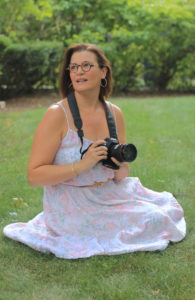
Thank You, Sabrina!!
CHICAGO MEMBERS!
Contact Sabrina for lifestyle family, children, engagements, portraits photos, model tests etc, and to purchase some prints to beautify your home
Lasse Elkjaer – Introducing LA-Based Danish Film Composer
/in Articles, Los Angeles, Member/by Kaisa KokkonenI had the pleasure to chat with Los Angeles-based Danish Film composer, orchestrator, and multi-instrumentalist Lasse Elkjaer.
Elkjaer is an award winning composer, who has worked with film composers such as Christopher Young, Spiderman 3 (2007), Jacob Groth, The Girl With The Dragon Tattoo (2009), and he collaborated on his award winning score with Hollywood cellist Tina Guo, whose cello can be heard on scores by Hans Zimmer, such as The Lion King (2019). Elkjaer moved to Los Angeles 7 years ago to study Scoring for Motion Picture and Television at University of Southern California with a Fulbright Scholarship, and has been there ever since.
Thank you so much for joining us Lasse! This is a real pleasure.
Lasse, can you tell us what brought you to this specific career path?
Growing up as a kid in the middle of the VHS boom, I fell in love with movies. My absolute favorite
childhood past time was watching movies that my family and I rented from the local video store. I
also spent a lot of time cutting out pictures of Indiana Jones, ET, and such from magazines, and
creating collages with my movie idols. We were pretty obsessed about Raiders Of The Lost Ark, and
the score for that movie was one of the first scores that made a very strong impression on me.
I was drawn to the idea of working in the movie industry early on, but I put that on hold when I
started to do competitive gymnastics, and later on when I became serious about guitar playing and
I distanced myself from my sport, I was deep into guitar hero land. So it was first in my early twenties
that I fully understood it was the music in movies that my heart was really beating for. I still
remember the turning moment, when I picked up a book with interviews with Hollywood composers
and realized that I could relate to their words more than anything else in the world of music. Before
that, I primarily focused on my career as a guitarist, and freelanced as an orchestrator and arranger
for musical theater, and whenever an opportunity arrived for me to help as a composer, I was more
than happy to do so. Even though I’d always been writing music, it honestly never occurred to me
that I actually could have a career as a film composer. But after I read that book, I got very excited
and started my career path in film composition.
What are some of the most interesting or exciting projects you’re working on right now?
Because of the lockdown, I’m finally able to find time to release some of my own music, something
that I’ve been wanting to do for a long time. Besides releasing a handful of my soundtracks, I’m also
releasing a solo album titled “Vignettes and Landscapes,” with my instrumental music recorded with
orchestra and smaller ensembles. The album belongs to both the classical and film scoring worlds,
and consists of compositions I’ve been writing throughout the years. So genre-wise, it’s not too far
from what I do when scoring movie scenes, but it’s still a bit different. One could say that the biggest
difference is that the music is not dictated by another person’s movie scene, but based on the movie
and images that are in my mind, which usually gives the music a different edge.
I was also invited by the Industry Club for Film and Media Composers in Denmark (BFM) and the
Norwegian Society of Composers and Lyricists (NOPA) to facilitate film scoring based webinars.
I discussed how it is to work as a film composer in Los Angeles, and different approaches and
working models composers use. Other topics I touched on are how to manage sleep when dealing
with deadlines, how to structure one’s day in blocks, and productivity and effectiveness.
How film composing is dealt with in Norway and Denmark is very different from here in the States, so
it was interesting to share my insights and hopefully be able to inspire my colleagues.
I’m also working on putting all that information into book form, so as I continue to develop content for
more classes, I’ll write new chapters.
Who are some of the most Interesting people you’ve interacted with? …maybe there are some stories about
them that you can share?
Beside singing happy birthday for John Williams, being asked gently to step aside by Ennio
Morricone when I was blocking his way at an event, I would say that Golden Globe nominated film
composer Christopher Young and Emmy Award Winning Danish composer Jakob Groth, have been
the most interesting and insightful people I’ve interacted and worked with. Both have been very
giving with knowledge, support, and advice to get me going with my own career, and I am very
grateful to have been under their wings.
Most of the Danish movies I watched in my childhood were scored by Jacob, and I always made a
point of watching his movies and TV-series, so I was very well aware of who he was when I finally
met him in person at the conservatory, where he was my film scoring professor. I was happily
surprised to learn that he’s just a big guitar nerd as I am, so when I began working for him, we
always had something to talk about.
Chris was very generous with me as when I was new in town he showed me around, and he
introduced me to a lot of nice restaurants and places, to make me feel more at home.
Which people in cinema history inspire you the most and why?
Danish filmmaker Carl Theodor Dreyer, who absolutely floored me the first time I watched his
masterpiece The Passion of Joan of Arc (1928) with Richard Einhorn’s music Voices of Light. I’m
mesmerized by the movie and very much in love with Renée Jeanne Falconetti’s performance as
Joan. Stunning piece of work, with an incredible past to it!
Recently deceased composer, Maestro Ennio Morricone is definitely one of the magnificent entities
in the film composer community, that is hard not to be inspired by. What he achieved with his music,
is pretty revolutionary! To me, his score for Once Upon a Time in the West (1968), is his
masterpiece. I really could not believe my eyes and ears the first time I watched the movie.
Everything about it is done with such skill and always gives me the chills.
Jerry Goldsmith’s writing really can be terrifyingly good. Studying his scores for Alien (1979) and
Poltergeist (1982) always makes my heart pump fast, in awe with the talent which lies behind every
note in those scores.
Composer Basil Poledouris just speaks to me in such a special way through his music. His
masterpiece Conan The Barbarian (1982) and The Blue Lagoon (1980) could not be bigger
opposites. He really understood how to handle emotions, from the ultra masculine to the sweetest
and most romantic, something I really appreciate and always take a note of!
How has your business evolved, as a result of the pandemic?
What happened to most of us, is that we immediately had to start working from home, when the
pandemic started. I’ve always had a home studio available, so it was not a significant change for me.
But what has changed, is that I now have a lot of virtual meetings instead of in person meetings,
which used to be harder to schedule. So that has opened some interesting opportunities, because
people have quickly shifted to the virtual world, and are more open to do so, because it can be done
quickly and spontaneously from home. Since the state of emergency was announced, Zoom has
exploded and it was quick to evolve its features to offer seamless meeting experiences. Zoom
meetings, webinars, jams, and concerts even began to appear and people have been connecting
and pushing the boundaries of what is possible to do remotely. Whereas I used to wait until I was in
Denmark to schedule in person meetings with my European contacts, and that seemed to be their
preference as well, now it’s completely fine to use Zoom instead, which has set things in motion for
me in very interesting ways, especially as the entertainment world is moving faster in Europe at the
moment.
What do you do, to bring goodness to the world?
I do my best through teaching. I’m a former music teacher and private music tutor, and I strongly
believe that teaching is a powerful medium to make a difference for people, and bring positivity to
the world. Everyone remembers a great and motivating teacher who perhaps believed in them when
they were about to give up and encouraged them to keep going. Teaching is not for everybody, and it
can be quite intimidating, but it’s a great way to reach people, and give them takeaways they can
use immediately or later in life. Even though it’s only music I teach, there are still tools in some
ideas, that can make people think and re-center their lives. It’s important to inspire, and to find
people who can inspire you.
In connection with teaching, I’ve been collaborating with ClassDojo, the world’s most-widely used
communication app for pre-K-8 schools, creating the soundtrack for the 12 episodes of their latest
Big Ideas series, that focuses on emotional intelligence. It was rewarding to be able to use my music
and knowledge of child psychology to enhance the emotional messages of the videos.
What tips would you give to your colleagues in your industry to help them thrive and not
burnout?
Have a clear path, be passionate about your work, and make sure to create the right team around
you. If it also helps you to pick up the phone and rant about life, collect guitars, eat ice-cream at
1am, go for it! Whatever helps you to continue and keep your focus.
Also accept that you ARE going to burn out at some point, and you will need time to recover. It’s like
being an athlete, if you keep exercising non stop, and do not find the time to rest and take in the right
nutrients, then you’re going to burn out and damage your body and mind. So if you put the pedal to
the metal, then you’re going to hit the wall at some point. Just plan for it and be prepared.
I like to keep in shape, eat healthy, and I don’t really have a taste for alcohol. I still sleep like a
teenager when I go on vacation, and that’s how I take good care of myself.
What are five things you wish someone had told you when you first started and why? Please share
a story or example for each.
1. Be less patient
I once sat on a project for years, before I had to give up and put it to sleep. After been married with it
so intensely for such a long time, it was really difficult for me to change my artistic vision, which was
necessary for me to move on with it. In this case, I’m quite sure that it would have been better to be
a bit impatient, so when I finally got to that crossroad where the opportunity arrived, then I would
have been able to mold my emotions around it, and to face the necessary compromises to go
forward.
2. Have a mentor and create a reliable team around you
It took me years to get a professional mentor, and when that first happened, then it was a game
changer! I’m really good at something, and not so good at something else. That “something else”
I need people to help me with! So, to have the right mentors and a great team around you can be
extremely important! But also make sure to be selective when you choose collaborators. Bad advice
will always be bad advice!
3. Travel to find opportunities
When I got the opportunity to move to Los Angeles, a plethora of opportunities opened up that were
not available to me in Denmark. Here in America I have built special skills and gained knowledge
within my field, that can be valuable to where I came from, so that opens up for even more
opportunities. I also had to travel to another country to find my fiancé, so there must be something to
it!
4. Be Authentic
Before anything else, you’ll need to ask yourself, who am I as a person and artist. And you have to
think about that very clearly. That is the foundation of an authentic career.
5. Do not take life too seriously; make sure to have fun.
You’ll always run into disappointments and failures throughout your career. If you take it all
personally and too seriously all the time, you’ll just exhaust yourself and will not have the necessary
energy to turn things around. There’s an art-form in finding something to laugh about even during
tough times. I recently saw an interview with my favorite classic rock band, Deep Purple. Having a
good sense of humor was what made them able to stick together, through all the absurdities they
had to go through over the years.
Is there any Danish food that you miss, in the States?
I do miss the good old Danish “rugbrød,” my mom’s rice pudding and ris-ala-mande, and the smell of
a Danish hotdog instantly makes my knees weak. So whenever I’m in Denmark, those are very high
on my list!
Is there a person in the world whom you would love to have a private breakfast or lunch
with?
I was very lucky to meet Norwegian director André Øvredal at an event just before the lock-down
here in Los Angeles. I’ve been admiring his work since Trollhunter (2010) which really is a fantastic
movie, and I would love to sit down and have a proper conversation with him. He really has a lot of
interesting work taking shape, and I think the direction he is going with his career is very exciting. His
cinematic sensitivity within genre movies is absolutely fantastic, and the way they’re grounded in
reality even if they’re set in a fictional fantasy world, is admirable. He is also just a very nice person,
which really is something to take a note of.
I also wouldn’t mind having lunch with Barack Obama. Brilliant person! I deeply admire him and
Michelle.
How can people follow you on social media to see what you are doing?
• Website: https://www.lasseelkjaer.dk
• Email: musicoffice@lasseelkjaer.dk
• Instagram: https://www.instagram.com/lasse.elkjaer_music/
• Facebook: https://www.facebook.com/lasse.elkjaer
• Twitter: https://twitter.com/lasse_elkjae
PS. A side note from EuroCircle Team: Lasse mentioned “The Girl With The Dragon Tattoo”, if you have not seen those fantastic Swedish movies yet. They are based on Stieg Larsson’s Millennium series – they are truly fabulous. So are the books!
Jo Detavernier, SCMP, APR – principal of Detavernier Strategic Communication
/in Articles, Member/by Kaisa KokkonenWe asked Jo Detavernier, SCMP, APR – principal of Detavernier Strategic Communication – who is experienced, accredited and multilingual consultant and PR entrepreneur tell us more about his business. Jo specializes in corporate communications, B2B PR and content marketing. He likes to say that his approach to PR is accountable, evidence-based and ethical.
In 2015, Jo moved from Belgium to Austin (TX), where he has been a VP and Partner at Swyft, an Austin based B2B PR firm, till 2019. As of 2020, Jo runs his own consultancy practice called Detavernier Strategic Communication. In addition to consulting, he is an experienced trainer for C-level executives helping them communicate their messages clearly and effectively through media and presentation skills trainings.
Thank you so much for doing this with EuroCircle! How did you select this specific career path?
I worked in-house in Brussels for the Belgian postal operator (now bepost).
This was more than 15 years ago. They had consultants help them professionalize their external communications. When I saw these people at work and read their memos, I knew for myself: I want to be a communications consultant. I have been a happy consultant since.
Any interesting stories that happened to you since you started your company?
I don’t have one story that sticks out. There are myriads of interesting anecdotes. Consultancy offers plenty of variety. Every client comes with a potential adventure. I think I have done everything wrong I could have done wrong in the last few years. But we learn from our mistakes.
What’s the funniest mistake you made when you were first starting? Any lesson you learned from that?
I will not admit here that I had at one point ordered business cards that did not have my phone number on them. When you are fatigued, take a break and give things a fresh look in the morning.
What do you think makes your services stand out?
Consultants come in very different types and sizes.
One of my differentiators is that my counsel is evidence-based. I study what the behavioral sciences have to say about a host of communication issues and I implement that as well as I can.
This makes that when my counsel is put into practice my clients see results that outshine the outcome of alternative approaches. I don’t often actually call it evidence-based when talking to clients however, I mostly talk in terms of being data-driven, which is a term that is easier understood,
Are you working on any exciting new projects now?
I have just launched a 75 minute remote media training that I am busy promoting with B2B firms.
I will also write a chapter for the new edition of the Handbook of Crisis Communication of which Timothy Coombs is the editor in chief. In my contribution I will elaborate on the ways that crisis communicators can put scientific insights on communication best practices to work
None of us are able to achieve success without some help along the way. Is there a particular person who you are grateful towards who helped get you to where you are?
I am grateful to all the partners and senior consultants in the agencies I have worked before.
Agency life can be challenging but the learning curve offered by PR agencies who are leaders in their local markets is of a value that is impossible to understate.
Have you been able to your success to bring goodness to the world?
My modest contribution to bringing goodness to the world is taking the fiduciary role I have towards my clients very seriously.
I work hard to move the needle for them and am sincere and transparent in all of my dealings with them. That might not sound spectacular, but it is not an approach shared by everybody who offers professional services on the market.
What are your “5 Leadership Lessons I Learned From My Experience” and why.
1. Habits are very important because of their compound effects. I study 5 hours a week.
That is not impressive as such, but it does amount to more than 250 hours of study a year. Year after year.
2. Don’t micromanage people. Ever. Give them objectives and a high level of freedom to reach their objectives. They will be efficient and happy at the job.
3. Make sure there are enough people who you consult on important decisions that will never care to flatter you. Leaders need devil’s advocates who challenge them.
4. Don’t hesitate to leave your comfort zone. Comfort is anathema to growth.
5. Understand that you always need to set the right example. Your leadership talk is worthless if you let your guard down and are caught violating your own rules. Be your best self all of the time. You owe this to the people you work with.
If you could inspire a movement that would bring the most amount of good to the most amount of people, what would that be? You never know what your idea can trigger.
Every movement that needed to be started has already been started by someone.
The United States is a country that is rich enough to shoot astronauts into space yet many people lead a precarious existence. I support causes that are meant to help people in this country get affordable access to high-quality healthcare and education.
What is your favorite “Life Lesson Quote” – how that was relevant to you in your life?
Through hardships to the stars. Nothing of value comes easy.
Is there a person in the world, or in the US with whom you would love to have a private breakfast or lunch with, and why?
There are plenty of people I would love to have breakfast with. Among them are Satya Nadella with whom I would like to discuss technology and Daniel Dennett who I would like to have a talk on free will with.
HOW TO CONTACT JO:
Jo Detavernier, SCMP, APR – principal of Detavernier Strategic Communication – www.jodetavernier.com
Jo Detavernier at LinkedIn
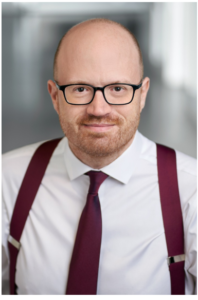
Susanna Lindholm: “Hello Atlanta – USA, bye Finland (and 6 other countries)!”
/in Articles, Atlanta, Member/by Kaisa KokkonenWe had the pleasure of getting to know Susanna Lindholm and her quite international journey from Finland to the USA. Susanna is new to Atlanta and would love to connect with Europeans and other international professionals.
She arrived @ Atlanta during very unusual period – during the pandemic.
Get to know Susanna via her own words below and feel free to connect with her:
Introduction
Hi all, nice to meet you!
My name is Susanna, I’m 29 and I come from Finland. Actually, I have lived in 7 countries and tried to learn 10 languages, so I’m quite an international person. Travelling is my dearest hobby and until now, I have visited 45 countries. I am new to Atlanta and would love to make new friends here! My education is Master’s in Business Management, and I work in Business Development and Marketing at gatc LP, which is a German-American company helping foreign companies to the American market.
Finland
Originally, I am from Finland, the land of snow and Northern lights. However, summers in Finland are quite warm (+20-25 C) and there are 188.000 lakes and 510.000 lake houses to enjoy the Finnish nature. The Finnish nature, forests and lakes are something that I always miss when living abroad.
Germany
The first foreign country for me to live in was Germany. I studied German language and Business Administration in Lüneburg and Münster. Germany has beautiful old cities and an excellent taste for beer. Something that I miss from Germany are the little bakery shops where to grab a pretzel or bread for breakfast.
South Korea
My second foreign country to live in was South Korea, where I studied Asian Studies and International Business. That was my first time in Asia, and I was excited about the cultural differences. The streets were cute with very colorful advertisements and karaoke rooms everywhere. Karaoke rooms were so much fun! I hope I could find something similar also in Atlanta.
India
After South Korea, I moved to India and did a traineeship in trade politics at the Embassy of Finland in New Delhi. At the beginning, life in Delhi was a culture shock for me. With some time, I started to enjoy the culture, the colorful clothes and of course the tasty Indian food. Living abroad increases the intercultural competence and understanding of diversity.
USA
From India, I moved to New York to work in Business Development at a chamber of commerce and organized business events in New York. New York has been one of my favorite cities so far! It is so diverse. When walking down the streets, almost everyone walking along is a foreigner. When basically everyone there is a foreigner, you will start to feel welcome and home as well. Also, the huge skyscrapers are impressive and great evidence how intelligent humans can be when able to create such incredible buildings.
China
From New York, I moved to China to work in International Marketing at a Chinese office furniture and real estate company. China surprised me positively! The Chinese nature had spectacular mountains and hiking opportunities and the food was super delicious (especially Chinese tomato soup)!
From China, I moved back to Finland for one year. I finished all my studies, which include four university degrees. Simultaneously, I worked in Sales and Marketing of SRV business premises in Helsinki. I still missed the international atmosphere and decided to move abroad once more.
Belgium
I moved to Belgium and started working in Marketing and Communications at the European Parliament in Brussels. That was the most intercultural organization I had worked for so far! I had colleagues from all European countries and even wider. That was quite happy time in Brussels, no signs of Corona pandemic yet.
Atlanta, Georgia, USA
Then, in March 2020, I got a great opportunity to widen my international experience in the USA.
I moved to Atlanta and started working at gatc LP.
Gatc LP is a German-owned company helping foreign companies to the American market by establishing subsidiaries. It is a perfect chance to use all my intercultural skills learnt so far. Most of our colleagues and clients are German, so German language practice is guaranteed. However, the official working language is English. We are also members of the Swedish chamber, so I can actually practice all three languages here. Previously, I have taught Finnish to foreigners as a hobby. If anyone is interested in learning languages, just let me know! Maybe we could practice Finnish, Swedish, or German together.
Now when the COVID-19 situation is starting to get better, I would love to meet intercultural-minded people in Atlanta! It would be great to share experiences and make new friends. Maybe we could go to cafes, restaurants, nightclubs, or sightseeing. And, one of my hobbies is ballroom dancing.
I am really looking forward to EuroCircle events and meeting everyone!
Feel free to contact me already if you might be interested in practicing languages or just making new friends.
This is me:
Facebook: www.facebook.com/susanna.lindholm.50
LinkedIn: www.linkedin.com/in/susannalindholm/
Twitter: https://twitter.com/Susanna_USA
Instagram: www.instagram.com/susanna_international/
EuroCircle forum: https://forums.eurocircle.com/profile/177364-susku/
Eha Urbsalu, The Viking Beauty Secrets & Sustainable Skincare
/in Articles, Member/by Kaisa KokkonenWe (finally) had the pleasure to “interview” Eha Urbsalu.
Viking Beauty Secrets Founder Eha Urbsalu from Northern Europe, where “Clean” and “Green” equals normal
She grew up in NORTHERN EUROPE and used to use local, NATURAL SKINCARE PRODUCTS made from PLANTS NATIVE TO THE AREA. These Nordic super antioxidant BERRIES have been used for skincare and health benefits for centuries.
To be precise, Eha grew up in Estonia, which at the time was part of the Soviet Union.
At 17, she was one of the Miss Estonia winners , as well as the first and last Supermodel of the Soviet Union. At 18 she came to the US to compete at the Ford Supermodel of the World competition. Eha placed 4th and started to model around the world. But her skin started to break up in New York from all the chemicals used in the skincare products, and in the food. Eha kept bringing skincare products from Estonia for herself and her model girlfriends in New York. Until finally she decided to start her own skincare brand, Viking Beauty Secrets. And the rest will be in Eha’s own words..and we will share her recent VIDEO interview on climate change with Scott Amyx.
I want to add that Eha is multi-talented – actress, singer and director – but that is for another story.
What have you discovered during your research?
While spending time with my late mother who, in her 80s’, still had rosy cheeks and healthy skin, I finally understood the secret was in nature. We must eliminate chemicals and return to using the nordic unpolluted ingredients native to Northern Europe and Estonia.
I know I wanted to use these Nordic “Viking” superberries as ingredients. We all know that Northern Europe is the eco-friendliest region of the world, sparsely populated, with cleanest air and cleanest soil, and highest scores on the Yale Environmental Performance Index.
What does the “Secret” in Viking Beauty Secrets stand for?
The secret is in our local ingredients grown on the unpolluted Nordic land. Viking Beauty Secrets’ products are inspired by the unique nature that Nordic people grow up with. My absolute favorites are three Viking super berries: Rowanberries, Cloudberries and Sea Buckthorn. These berries provide a megadose of antioxidants , vitamin C and give you that “I slept really well” glow.
EuroCircle’s note: Cloudberry is the favorite berry of many Finnish people. They are hard to get – and quite expensive.
It makes a difference where the plants grow. You cannot just take a plant from Northern Europe and plant it in China, and expect the same results.
In fact, there is a quote I have from Dr. S. Dharmananda, PhD, Biology, Director of the Institute for Traditional Medicine and Preventive Health Care:
“Plants that evolve in severe climates produce special proteins, amino acids and antioxidants that help them survive, grow, and repair, and they can convey their protective and reparative actions when applied to the skin.”
Also, “In order to survive extreme cold temperatures as low as -50°C, arctic berry species, such as sea buckthorn, cloudberry, bilberry and cranberry have developed a highly unsaturated lipid profile. Seed oils from arctic berries are enriched with α-linolenic and linoleic acids, the two essential fatty acids together constituting up to 90 % of the total fatty acids. The special fatty acid composition makes arctic berry seed oils a valuable source of essential fatty acids for both internal and external care of the skin.” (www.aromtech.com)
So what differentiates Cloudberries for example from other high Vitamin sources?
For example, the Cloudberries we use, really like VERY COLD. They survive in Finland in minus 46 degrees Celsius in the winter, so when they come up in the summer, they soak up all the antioxidants , so when you harvest them in the end of the summer, they are super potent, as they are ready to survive the 9 months of winter.
During the long nordic summers they produce extremely high amounts of Vitamins. Comparatively, 100 grams Cloudberries pack twice as much vitamin C as 100 grams of oranges. Their impressive concentration of antioxidant Vitamin E helps heal your skin and protect it from the damaging effect of free radicals. Omega-6 and omega-3 help minimize the appearance of fine lines and wrinkles. The berry is so potent that it became one of the main ingredients in our night cream.
What does “clean beauty” mean to you?
In Northern Europe, “clean” and “green” equals the normal standard. It was disturbing to learn that, while the EU bans over 1,300 chemicals from skincare, the U.S. only bans 30.
All of the Viking Beauty Secrets products are Greenlife Cosmos EcoCert Organic Certified. EcoCert is the largest certifiacation agency in Europe.
Think Dirty, a Canadian company that verifies skincare ingredients, gave Viking Beauty Secrets certified organic Day Cream the Best Moisturizer of 2019 award.
How hard is it to get the Ecocert COSMOS Organic Certificate?
It is very difficult process and it is more expensive to use organic ingredients. But I am lucky that I found a first class scientists and laboratory in Latvia, which is one the least expensive European Union countries, so we can offer our products in a very affordable prices. I think that in the end of the day, it is definitely worth getting the certificate and I am proud of having our products organic certified.
What’s next for Viking Beauty Secrets?
Our certfied organic exfoliating face scrub with Iclandic volcanic ash and Rowanberries, is the only scrub offered in US with these nordic ingredients. Many scrubs selling in US still use plastic microbeads, which go through the drains into icean and fish eat it and so on. Our excfoliating oil based scrub, which turns to milky lather when it touches the water, is truyly sustainable: it comes from ocean and ends uo in the ocean, and we have the Greenlife Ecocert COSMOS Organic Certificate to prove it.
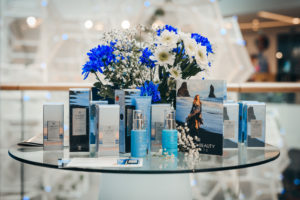
P.S. We can give a special code: EUROCIRCLE —-> 20% off entire order!
VIKING BEAUTY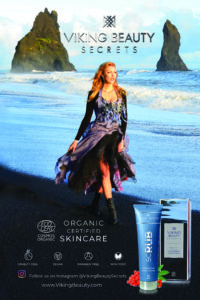
https://www.facebook.com/VikingBeauty/
Meet Marina Simovic – a Manhattan-based certified Stretch Therapist and a professional Reiki Practitioner from Bosnia and Herzegovina
/in Member, New York/by Kaisa Kokkonen I had the pleasure of interviewing Marina Simovic, Marina was born and raised in Bosnia and Herzegovina. She moved to New York almost 20 years ago (as of 2019) with a suitcase and a passion to help people in their health and wellness. Originally she was in the USA just for a short stay not more over a year to improve her English language. At the time she was a student at Mostar University close to my hometown Ljubuski close to Medjugorje.
After one year Marina simply fell in love with New York. Passion for health and wellbeing inspired her to be certified in a Stretch theraphy. Marina operates as a fully certified Stretch Therapist and a professional Reiki Practitioner. She concentrates her efforts on stress reduction and relaxation which promotes health and wellness. Over the years, Marina has perfected the art of helping other people’s bodies, emotions and the spirit which have lots of benefits
Can you tell us more about what brought you to this specific career path? It is not exactly the most common or known path to choose.
What brought me to this specific path was my passion and dedication towards healthy lifestyle and making difference in people’s life.
I was a long distance runner in between two major stages in life, high school and transition to college. Since I come from a very small place in Europe ( Bosnia and Herzegovina) people thought sometimes that my running was weird and I was not fitting in with other girls my age- but nevertheless I continued to do so.
As an adult my passion continued, and I worked in a big Export- Import company- where employees would have extremely destructive eating habits and no specific diet or physical activity. So, I would cut and place articles and healthy recipes, on our company kitchen display and talk with people about working out.
I could say it’s not one thing that led me to this career path – it was a gradual development along the way.
May I ask you to share the most interesting experience you have had since you started your career?
The most interesting experience I have had since I started a company, was probably encountering so many interesting and different people. I had so many different corporate events, fairs, fashion- official events such as US Supreme court technology and arts. I have enriched my life with so many different people and grow so much as an individual. I can actually sit with a person from any walks in life and we would have a great conversation about anything that is beneficial and interesting commonality to both. I am so grateful for every day which is an adventure in my profession.
What advice would I give to other women who may want to take that next step and following their dreams or either running or starting their own company?
Dear ladies, be kind to yourself- take care of yourself-emotionally, physically, mentally and financially.
Along the way to your dream, make meaningful connections with people- long lasting and genuinely care about people.
On your way to the top- you might or will change professions, what ever impression you leave on people will be everlasting. They will support you no matter what you choose to be. It is YOU- NOT YOUR BUSINESS.
Is there a funny (scary?) story that you could share that happened to you since starting your company?
Funny/Scary story – I could write a book
Couple of them – I did a corporate event with a group of people we work with and they mixed the emails so we were not welcomed because they had another vendor there – in the meantime I brought 4 people to help me with this event- to my surprise they were not angry or mad at me – but they set up the table regardless and let me handle everything with HR department even though I was not directly involved – They said we knew you will handle this- talking about confidence of my team- but also they know how passionate and committed I am. On the side note I talk a lot so they had no doubt in their mind that all will end well.
The second scary/funny part happened in US Supreme court when they took possession of my laptop prior to the event- and I was on the list to participate as a vendor and had a presentation on that laptop.
I actually had to write an email, for someone from HR to come downstairs and convince guards that there is no treat because of electronic device- only presentation about – you will never guess – Forgiveness meditation – that was recorded with no issues later on.
If you could go back in time and talk to your younger self, what would you tell her and why? What message(s) would you like for her to know?
If I could go back to the time- I would not change or say anything because I would not be the same person as I am today. I worked diligently to become who I am today – and I kind of like myself and what I do.
Can you share 3 of the best words of advice (quotes) you’ve gotten along your journey? We would love to hear a story or example for each. We all could use some inspiration.
ADVICE #1 Be the best version of yourself- when you are a best version of yourself in life nothing will stop you.
You will encounter people who are not your match sometimes, but you have to strive to be the best then you will attract the best for yourself and you will strive to recognize the best in people.
Do not lower your standards, your prices your character to please people.
Be the best you can and you will have the best in life.
ADVICE #2 Be the type of the person that makes everyone you come across feel perfectly ok with being exactly who they are.
When you allow people to be who they truly are you shine a light upon their path that maybe no one was recognizing that in them before.
Only for that they will respect you and share and openly communicate with you and genuinely connect.
When you come to a place of such there is no greater award then creating from a place of authenticity and integrity.
ADVICE #3 Wake up with a purpose.
Whatever you do professionally pursue, let it be purposeful. When you wake up and start your day – your excitement and zest for life is connected to that purpose.
Your only question should be: How can I bring value and change someone’s life Today?
We all need a little help along the journey — who have been some of your mentors? Can you share how they made an impact?
My mentors – great question by the way… Anthony Robbins is one of them. And not just because of his business mindset but also for a vast love towards humanity – and I felt that upon meeting him- big giant with even bigger heart.
Overall, human capacity to love and connect is or are my mentors- names are irrelevant.
You are a person of great influence. If you could inspire a movement that would bring the most amount of good to the most amount of people, what would that be? You never know what your idea can trigger.
Movement that will change people’s lives.
I think I am already slowly building that momentum- I teach people how to be purposely connected, Reiki emotional healing, Essential oils, Detox free home, Meditation and also building community around that.
Can you please give us your favorite “Life Lesson Quote”? Can you share how that was relevant to you in your life?
Favorite Life Lesson Quote- Learn and apply.
In life I learned so many things – but then I learned without application of learned lessons, lectures or words it’s just accumulated knowledge. To really create a difference words have to be put in action- therefore you are creating movement and change.
I also learned to have boundaries with people and situation – not everything in life requires your immediate attention- be still, release and let go.
Your story is very inspiring, Marina. Not to mention even most Europeans have not met many people (if any) from your country – just like most people do not know anyone from Finland. Not a huge country. Thank you so much for joining us!
And for those of you who wish to to connect with Marina – and maybe try some stretch therapy or reiki:
Instagram- https://www.
www.flexhealing.com
You can find her number and address in Manhattan (30s) at the Flexhealing website


